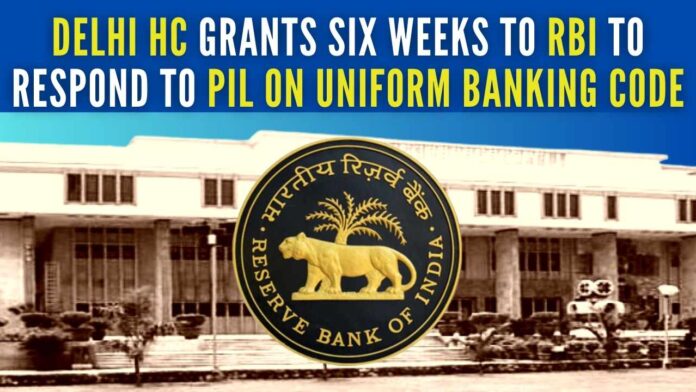
Delhi HC grants time to RBI to respond to PIL
On Monday, the Delhi High Court gave six weeks’ time to the Reserve Bank of India (RBI) to file a response in a plea seeking directions to implement Uniform Banking Code.
Filed as a Public Interest Litigation (PIL) by Advocate and BJP leader Ashwini Kumar Upadhyay, the plea raises the need for a Uniform Banking Code for foreign exchange transfers to regulate benami transactions and the creation of black money.
A division bench of Chief Justice Satish Chandra Sharma and Justice Subramonium Prasad granted time to RBI for filing a response.
In the previous hearing, the bench had given notice to RBI and directed that the entire set of documents be given to its standing counsel while considering the significance of the matter.
Additional Solicitor General Chetan Sharma appearing for Centre submitted that the plea raised a serious issue that required detailed examination.
The plea stated that the “immigration rules for Visa are same whether a foreigner comes in Business Class or Economy Class, uses Air India or British Airways and comes from USA or Uganda. Likewise, deposit details in Indian banks, including foreign bank branches for Foreign Exchange Transaction must be in the same format whether it is export payment in a current account or salary, in a savings account or donation, in a charity’s current account or service charges payable in YouTuber’s accounts.”
“Foreign Inward Remittance Certificate (FIRC) must be issued and all international and Indian banks must send the link through SMS to get FIRC automatically in case the foreign exchange is being deposited in the account as converted INR,” it stated.
“Moreover, only a person or company should be permitted to send Indian rupees from one bank account to another inside the territory of India through RTGS, NEFT, and IMPS and international banks should not be allowed to use these domestic banking transactions tools,” the plea further said.
[With Inputs from IANS]
PGurus is now on Telegram. Click here to join our channel and stay updated with all the latest news and views
For all the latest updates, download PGurus App.
- UP Special Task Force arrests Mahadev app India head, his associate from Lucknow - April 26, 2024
- CBI raids Sheikh Shahjahan’s relative in Sandeshkhali; seizes huge cache of arms, explosives - April 26, 2024
- Will ‘exit India’ if forced to break encryption: WhatsApp to Delhi High Court - April 26, 2024










